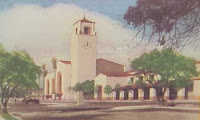
October 24, 1943
(Camp Abbot, Oregon)
Dear Folks,
I still haven’t received any mail from you. I know it can’t be helped because of that mistake about what Company I belong to, but still I sure get lonely for a letter from home. I want to hear about everything that goes on at home no matter how unimportant it may seem-what the neighbors are doing-and so on. The more you write the higher my morale will go.
Well, today was my second day of real training. I got out of the hospital early yesterday, or rather the day before yesterday. It was then I found out that I was in Co. “B” instead of “C”. It seems funny though. I should have received the mail anyway.
I didn’t do much the day I got out except draw my equipment an so, but at 5:30 the next morning I was off. I’m still at a disadvantage around here since I missed a week’s training, but since I’ve had a lot of what we(re) getting it sort of evens things up.
The toughest thing of all is the fact that we never get a minute’s rest. From the moment I get up till sundown I’m on the go. Close order, extended order, etc. When you aren’t doing something violently physical, they take you to the movies for lecture, and propaganda pictures. All this in about 6 inches of slushy snow and water. We did that all yesterday. In the evening I got a G.I. haircut. It cost me 45 cents. I was in the chair for exactly 85 seconds. You can imagine how I look.
The most never ending job in the Army-cleaning one’s rifle-usually takes up most of the evening. Today is supposed to be our day off, ha ha! We got up at the usual time and went out to the rifle range. It was the first time I ever fired my M1 Girand. It hardly kicks at all.
Things are pretty tough now; even the non-coms are pooped, and we’re on field rations which although are better than they sound are not terrific. After the first 5 weeks we’ll be put on garrison rations and that’ll be a lot better.
We get plenty of good warm clothing, but if you would like to send something make it a khaki wool scarf.
Hooray! I just now got your letter, Mother. I wasn’t going to mention it but until 5 minutes ago I was the most homesick guy in the whole 4th. Engineers. Now I feel a whole lot better.
About the goddam camp. Yes, it is new. It was founded last May, and it’s still pretty rough. There are about 20,000 men here and a number of other camps nearby.
I was surprised to hear about the cold weather in L.A. It’s really quite a drop from what it was that Sunday I was home. The temperature here has been about 20 deg. above but now it’s a little warmer. In fact, for about an hour today we even got a look at the sun.
All in all, this is a pretty good outfit. It’s made up of mostly young fellows, and platoon, company, and battalion rivalry is pretty high. On top of it all the Engineers is a pretty high falutin’ outfit.
I’m sending you my insurance slip which is good in place of the policy until you receive the real one.
Some of the fellows here have cameras and maybe I’ll be able to send you some snapshots.
Love,
Bill
(Co. “B” 53 ET bn)
ME IN THE COLD------- (SKETCH HERE)















